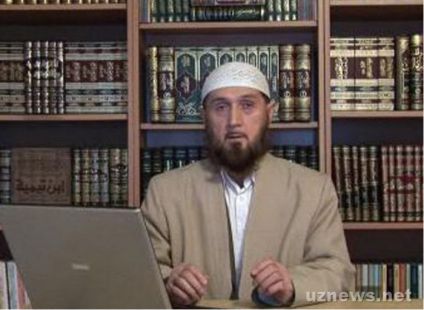
Uzbek Dissidents Under Death Threats in Sweden
Publication: Eurasia Daily Monitor Volume: 9 Issue: 196
By:

A court of appeals in the Swedish town of Sundsvall will consider an appeal lodged by prosecuting authorities in a case of attempted murder of Imam Obidhon Nazarov in early 2013.
Prosecutor Krister Petersson, who investigated the attempt on the life of Nazarov, a well-known Uzbek imam in Sweden, is expecting that his complaint on a ruling issued by a court of first instance will be considered in early 2013. According to Petersson, this long wait is linked to the Sundsvall court’s busy schedule and the fact that the suspects accused of complicity in the crime, Uzbek citizens and a married couple, Bakhodyr Pulatov and Nodira Aminova, are not under arrest. Petersson appealed against the court of first instance’s July 26 ruling to acquit and release the spouses for a lack of evidence. Pulatov and Aminova were suspected of helping to organize an attempt on Imam Nazarov’s life, who has lived in Sweden as a political refugee since 2006 (Uzbeknews.net, October 24).
On February 22, the imam was shot at the door of his home in Sundsvall. Since then, he has been in a coma. The gunman, who Swedish investigators identified as Yuriy Zhukovskiy, held passports of both Russia and Uzbekistan (Fergananews.com, October 17).
Prosecutor Petersson believes that he had gathered enough proof of the married couple’s guilt in the attempted murder. Pulatov and Aminova, according to investigation reports, arranged accommodation for Zhukovskiy in Sweden and paved the way for him to get close to the imam, for which they received thousands of US dollars into their accounts. Since the day of their release, Pulatov and Aminova had the right to leave Sweden. In an interview with Uznews.net, Petersson said that he did not know about the couple’s whereabouts. Their visas allow them to stay in Sweden until the summer of 2013 (Uzbeknews.net, October 24).
On October 13, the Swedish press reported that Zhukovskiy, the main suspect in the case, was detained in the Russian Federation, when using the same telephone that was used in Sweden. The Russian Federal Security Service (FSB) detained him at the request of their Swedish counterparts. His extradition to Sweden is currently being arranged (Expressen, October 13).
Zhukovskiy is also suspected of taking part in a similar, though successful murder of Uzbek businessman Fouad Rustamhodzhaev in Ivanonvo, Russia, on September 24, 2011. Although Rustamhodzhaev lived in Ivanovo and had Russian citizenship, he strongly supported the anti-Karimov opposition. In his former hometown of Andijan, the Uzbek businessman had strong links with members of Akramia, an unsanctioned Islamic organization in Uzbekistan founded by Akram Yuldashev. In 2005, Rustamhodzhaev tried to establish a branch of Akramia among local Muslims in the city of Ivanovo (Fergananews.com, October 17; September 26, 2011; author interviews with Akramia members in October 2005 in Andijan).
Nazarov is one of Uzbekistan’s most popular Muslim theologians. Over 1,000 Muslims used to meet in the 1990s at the Tukhtaboi mosque where he was an imam. Recordings of his sermons, which the authorities regard as illegal, are still being distributed throughout Uzbekistan. In 1998, after publicly criticizing the authorities’ decision to ban beards and the hijab, Imam Nazarov was forced to leave Uzbekistan to avoid arrest. Authorities in Uzbekistan arrested several of his relatives, and one of his sons disappeared without a trace. Nazarov himself was accused in absentia of undermining Uzbekistan’s constitutional order and was denounced as a leader of the country’s Wahhabis.
Wahhabism strives for what it regards as an Islam purified of later additions and innovations and rejects the veneration of holy places and construction of expensive gravestones, seeing this as idolatry. Strictly speaking, the movement is linked to the Hanbali madhhab (school) of Sunni Islam, which has become the official faith of Saudi Arabia. However, the term “Wahhabi” is widely, and generally inaccurately, used as a term of abuse for devout Muslims in Central Asia. Nevertheless, Nazarov voices views that are typical of the Hanbali madhhab. During a phone interview with the author in October 2006, Nazarov strongly opposed the veneration of holy places and favored a ban on music at weddings. He also expressed his belief that women should wear the paranja (a full-length robe designed to completely hide the outline of a woman’s body). Interestingly, in June 2006, Uzbekistan’s former chief mufti Muhamad Sadyk Muhamad Yusuf, who can be considered a source of information independent of President Islam Karimov, told the author that Nazarov could be identified as a so-called Wahhabi, “but it does not follow from this that he is a terrorist,” he noted (Forum-18, November 6, 2006).
In exile in Sweden, Nazarov continued to criticize the Karimov regime. The imam was regularly visited by Muslim Uzbeks from Europe and even from the United States. Each Saturday and Sunday began with a sermon in the community, as well as discussions of the political situation and methods of political struggle against the regime in Uzbekistan (Fergananews.com, October 17). Nazarov has a website on the Internet where he strongly criticizes Uzbekistan’s authorities. Also, CDs featuring Imam Nazarov’s sermons, in which he preaches against the Karimov regime, are illegally distributed in Uzbekistan. “Obviously Obidhon Nazarov is not just a religious activist, but a very influential politician. He is the political leader of all religious Uzbeks, and his elimination is very profitable [beneficial] for the Karimov regime,” Tulkin Karaev, an Uzbek journalist and refugee, told Jamestown from the Swedish city of Timro on October 24.
Fear has gripped Uzbek refugees living in Sweden following the attempted murder of Imam Nazarov. People are afraid that Uzbekistan’s authorities will carry out new attempts on the lives of Uzbek dissidents in Sweden. Evidently the Swedish police believes these fears are well grounded. Notably, Swedish police and security services have begun providing protection to the former imam from Karakalpakstan, Uzbekistan, Muhammasalih Abutov. The police insist on changing Abutov’s name and surname for Swedish ones (Fergananews.com, October 17). “I now have several phone numbers of police employees and SÄPO, the Swedish security service, where I have to report immediately if I feel a threat. Other religious Uzbeks are scared, too. Now many Uzbeks change their names and surnames for Swedish ones,” Abutov told Jamestown on October 24.
Prior to these events, ample evidence already existed for Uzbekistani security services operations against Uzbek dissidents in foreign regions bordering on Uzbekistan. For example, from the beginning of the 2000s, about ten citizens of Uzbekistan were kidnaped in Kyrgyzstan by Uzbekistan’s security services. Furthermore, in October 2007, Kyrgyzstani journalist Alisher Saipov was killed in Osh (Southern Kyrgyzstan). A Kyrgyzstani citizen of Uzbek ethnicity, Saipov had aggressively covered Uzbekistan’s political scene. A month before his slaying, state-controlled Uzbek media had smeared Saipov in its publications and broadcasts. He reported being followed by Uzbek security agents. Many analysts and human rights experts believe that Saipov’s murder resulted from his struggle against the authorities in Tashkent (Fergananews.com, October 24).




